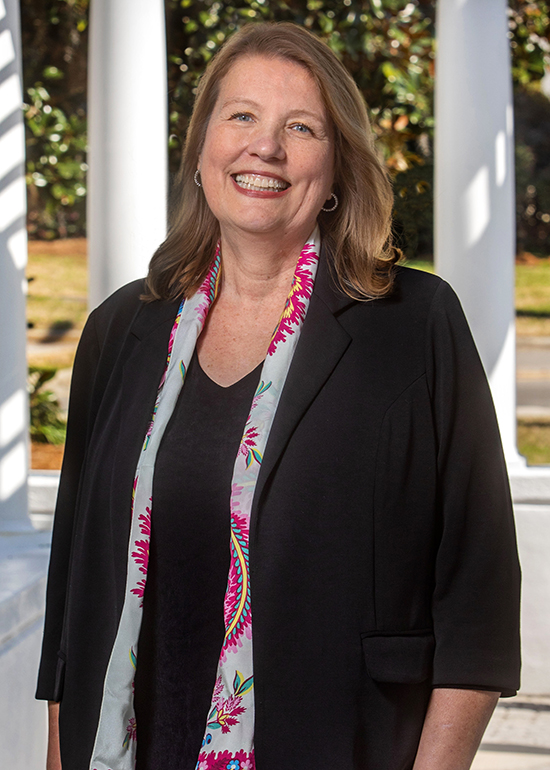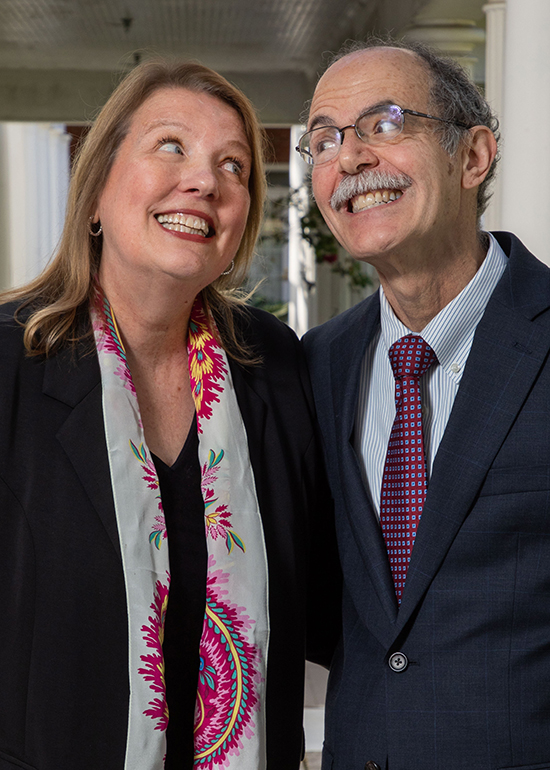Advancing the Greater Good Through Research and Resilience

As an undergraduate student, Karen Oehme knew she wanted
to work for a “greater good.” Oehme quickly made that aspiration a reality after graduating from law school in 1987, when she joined Legal Services of North Florida. She then cemented her commitment to public service by taking a job at the Second Judicial Circuit’s Guardian ad Litem Program.
Now in her 25th year, and 15th as director, at FSU’s Institute for Family Violence Studies, Oehme has made the greater good a lifelong commitment. Through research and collaboration with academics and students, Oehme also has maintained a focus on many of the topics that piqued her interest in law school, including family law, mental health, domestic violence, and psychiatry.
When Oehme joined the Institute for Family Violence Studies in 1998, where she ran the Clearinghouse on Supervised Visitation Program, research and scholarship were not on her agenda. However, she soon recognized a compelling need for research in the field.
“In the area of family law, there were some gaps in the literature, and as a lawyer, I could easily identify what those gaps were,” Oehme explained. “I realized we needed to do research and to be contributing to the knowledge base.”
Since then, Oehme has published extensively and was named an FSU Distinguished University Scholar in 2011. She works with four writing and research teams in different areas: criminal justice, trauma and resilience, successful co-parenting after divorce, and the work of first responders in relation to human
trafficking and domestic violence.
“I believe in working with multidisciplinary teams of people.” said Oehme. “Our teams include people from all around the country in different disciplines. I really love to talk to, plan with, learn from, and listen to other researchers.”
Oehme’s professional and personal lives intersect through her scholarly collaboration with husband Nat Stern, who recently retired as FSU Law’s John W. & Ashley E. Frost professor. “He’s a great sounding board,” said Oehme, who calls Stern her soul mate and north star. “He has to listen to all my crazy ideas, and I bring him in on a lot of research. We talk about the law and policy a lot.” The couple has endowed a scholarship at the College of Social Work.
Currently, a large part of Oehme’s work is the FSU Student Resilience Project, which is an online, self-help portal and campus campaign that provides students and others with world-class resources to help them deal with stress and trauma. It includes information for students on a wide variety of topics, including alcohol use, depression, mindfulness, and navigating the first year of college. The campus-wide initiative is the product of collaboration among 12 different university units and involves the highest levels of university leadership. In 2019, the project won the prestigious John L. Blackburn Award for Solutions to Campus Problems from the American Association of University Administrators. Anyone with an FSU ID can access the resources at Strong.FSU.edu.
The FSU Student Resilience Project “acknowledges that students may need a little bit of extra help and that they may have a tremendous number of stressors in their lives, and it teaches them new coping and stress management skills,” Oehme said. “It really normalizes help-seeking and connects students to the resources on our campus. FSU is a very resource-rich institution, and we have a lot of wonderful resources for our students, but there are a lot of students who do not know about them.”
One unique aspect of the Student Resilience Project is that the message is crafted and delivered by students. And one of Oehme’s greatest professional joys is working closely with students on this and many other projects.
“I work with students across campus—students in social work, law students, federal work-study students, and students from other colleges who are interested in these issues,” said Oehme. “They want to find out if their eventual work in the community can be informed by the things we know about trauma and resilience. At the end of the day, they keep everything we’re doing fresh and relevant. These students guide us in the design and the implementation of our projects because they are on the cutting edge, they are totally fearless with technology, and they accept everyone. The most exciting thing about my job is that I get to mentor these talented, enthusiastic students, and I learn much more from them than they probably learn from me.”

As chair of the steering committee for the Academic Resilience Consortium (ARC), Oehme also works with academics and student support staff from around North America to communicate with other campuses about the resiliency tools students need as the world changes. She is excited about FSU hosting an ARC resilience conference in October, at the university’s Turnbull Conference
Center.
Another primary focus of Oehme’s recent work has been creating multidisciplinary professional development courses on trauma and human trafficking. The courses are the result of a realization that everyone—not just students—can benefit from trauma-informed training.
“I started working with the Office of the State Courts Administrator on trainings for judges, and then we began working with the Center for Academic and Professional Development, and now we have a portfolio of professional development courses online,” Oehme explained. “For the past five years we’ve been doing a tremendous amount of work on the issue of trauma, how trauma affects people throughout their lifespan, and how a realization of that should affect policy and law.”
The professional development courses have broad application and are helpful for anyone who works with victims of trauma, including lawyers and judges. Oehme noted that in addition to gaining skills to help their clients, legal professionals enrolled in the courses can earn professional certifications and continuing education credits.
Because her research and scholarship apply broadly, Oehme speaks around the world about trauma and resilience, giving her another important way to spread the word for the greater good.
“The great message of resilience, across populations, is that it gives people hope,” Oehme said. “There is always hope for healing. That is my favorite message. We’ve learned the brain has this incredible capacity to heal, and there are things we can do to help heal our brains and to be healthier. I love that message of resilience because this is a time when people really need hope. People need to be reminded, ‘it’s going to get better.’”
As printed in the 2022 issue of Florida State Law magazine.
